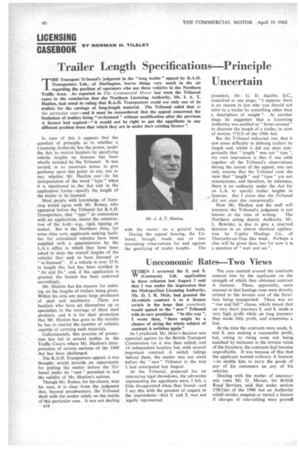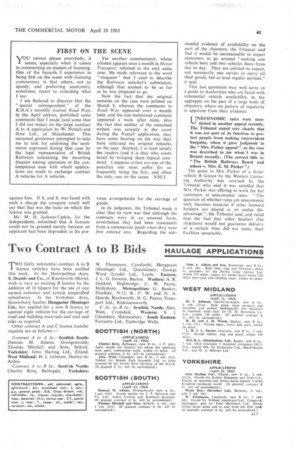Uneconomic Rates—Two Views
Page 42

Page 43

If you've noticed an error in this article please click here to report it so we can fix it.
WHEN I reviewed the S. and S. Vif (Contracts) Ltd. application in these columns last August I said that I was under the impression that the Metropolitan Licensing Authority, Mr. D. I. IL Muir, bad granted the 16-vehicle contract A to A licence switch in the hope that somebody would appeal to the "new" Tribunal with its new president. "In this way ", I wrote then, "there might be a chance of airing the whole subject of contract A switches again."
As I predicted, Mr. Muir's decision was appealed against by the _British Transport Commission (as it was then called) and 14 independent hauliers but, with several important contract A switch rulings behind them, the matter was not aired before the " new " Tribunal in the way I had anticipated last August.
At the Tribunal, prepared for an interesting legal showdown, the advocates representing the appellants were, I felt, a little disappointed when they found—and I say this with the greatest of respect to the respondents—that S and S. was not legally represented. The case centred around the contracts entered into by the applicants on the strength of which they obtained contract A licences. These, apparently, were unusual in that haulage rates were directly related to the invoice cost of the furniture being transported. There was no "rise and fall" clause, which meant that on very short journeys S. and S. made a very high profit while on long journeys they made little profit, and sometimes a loss.
At the time the contracts were made, S. and S. was making a reasonable profit, but, owing to rising costs not being matched by increases in the invoice value of the furniture, the contracts had become unprofitable. It was because of this that the applicant wanted ordinary A licences —to enable him to carry the goods of any of his customers on any of his vehicles.
Dealing with the matter of uneconomic rates Mr. G. Mercer, for British Road Services, said that under section 17,8(I)(e) of the 1960 Act an Authority could revoke, suspend or curtail a licence if charges of rate-cutting were proved
against him. If S. and S. was faced with such a charge the company could well say that that was the basis on which the licence was granted.
Mr. M. H. Jackson-Lipkin, for the independents, submitted that A licences could not be granted merely because an applicant had been imprudent in his pre
vious arrangements for the carriage of goods.
In its judgment, the Tribunal made it clear that its view was that although the contracts were in an unusual form, nevertheless they had been reasonable from a commercial point when they were first entered into. Regarding the sub
stantial evidence of availability on the part of the objectors, the Tribunal said that it would be unreasonable to expect customers to go around "seeking one vehicle here and two vehicles there from day to day. They are entitled to expect, not necessarily one carrier to carry all their goods, but at least regular services," it said.
This last quotation may well serve as a guide to Authorities who are faced with substantial vehicle availability in the aggregate on the part of a large body of objectors, where no pattern of regularity is apparent from their evidence.
1NECONOMIC rates were mentinned in another appeal recently. The Tribunal stated very clearly that it was not part of its function to protect people from making improvident bargains, when it gave judgment in the "Mrs. Parker appeal ", as the case was described to me when I was hi Bristol recently. (The correct title is: "The British Railways Board and others v. Mrs. E. M. Parker ".)
The grant to Mrs. Parker of a threevehicle B licence by the Western Licensing Authority was reversed by the Tribunal who said it was satisfied that Mrs. Parker was offering to work for her customers at uneconomic rates. "The question of whether rates are uneconomic only becomes material if other licensed hauliers are placed at an undue disadvantage ", the Tribunal said, and ruled that the fact that other hauliers (the objectors) would not guarantee delivery at a certain time did not make their facilities unsuitable.




















































































































